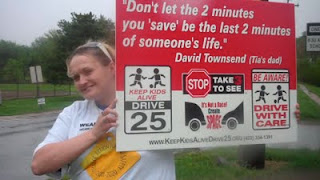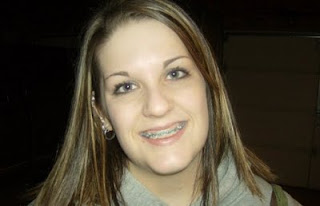This morning at a local YMCA I noticed a lesson that can be applied to our driving behaviors.
An older gentleman held the door open for a troop of kids participating in summer camp. The first 10 or so walked through without saying a word. Then, one young boy - probably 7 years-old - said "thank you." Every child who followed him thanked the man for holding the door. That young boy had set courtesy in motion with two simple words - thank you.
Opportunities present themselves every day to start a wave of courtesy on roadways throughout the world. What do these opportunities look like?
They look like stopping at stop signs, using turn signals, obeying speed limits, and setting cell phones aside to concentrate on the task at hand - driving.
What drives you to courtesy behind the wheel? Your examples are welcome.
In safety,
Tom Everson
www.KeepKidsAliveDrive25.org
Friday, July 15, 2011
Thursday, July 14, 2011
Every Decision You Make Behind the Wheel Can Keep Kids Alive
A friend shared the following wisdom gained from her high school driver's ed teacher.
When driving, ask:
"Will the decision I am about to make behind the wheel help to keep me and others alive?"
This question can be expanded to concretely address many unsafe driving behaviors, including:
Will turning off my cell phone before I begin driving help to keep me and others alive?
Will wearing a seat belt and expecting others in my vehicle to do so help to keep me and others alive?
Will observing the posted speed limit, and adjusting downward to account for the presence of pedestrians, cyclists, kids at play, and weather conditions help to keep me and others alive?
Will stopping at each and every stop sign and correctly observing all traffic signals and signage help to keep me and others alive?
Will maintaining a safe distance between my vehicle and others around me help to keep me and others alive?
In safety,
When driving, ask:
"Will the decision I am about to make behind the wheel help to keep me and others alive?"
This question can be expanded to concretely address many unsafe driving behaviors, including:
Will turning off my cell phone before I begin driving help to keep me and others alive?
Will wearing a seat belt and expecting others in my vehicle to do so help to keep me and others alive?
Will observing the posted speed limit, and adjusting downward to account for the presence of pedestrians, cyclists, kids at play, and weather conditions help to keep me and others alive?
Will stopping at each and every stop sign and correctly observing all traffic signals and signage help to keep me and others alive?
Will maintaining a safe distance between my vehicle and others around me help to keep me and others alive?
"Don't let the 2 minutes you 'save' be the last 2 minutes of someone's life." David Townsend - Tia's Dad
In safety,
Tom Everson
Tom@kkad25.org
Sunday, July 10, 2011
A Compassion that Moves Us to Action to Keep Kids Alive
Recently I viewed an on-line video of Krista Tippett on "Reconnecting with Compassion." Her insights challenged me to think about compassion as it relates to the mission and work of Keep Kids Alive Drive 25.
How so?
She shares that "story" is a critical element of compassion. To me this says that sharing our stories is critical to moving us toward action to bring greater good into our world. In the case of Keep Kids Alive Drive 25 I have experienced this great goodness through the families that survive loved ones who have died in motor vehicle incidents. These are mothers, fathers, brothers, sisters, grandparents, aunts, uncles, and cousins who choose to create a legacy of good in our world in memory of their loved one. In doing so they keep their loved one's story alive in a way that calls us all to make a positive difference through our driving behaviors, and, in fact, through the ways we live our whole lives.
Who are some of these families?
The Reynolds - see Cady
The Rowans - see Erika
The Prestons - see Graeme
The McPhersons - see Brandon
The MacMillans - see Nick
The Mairs - see Gabby
The Ranyaks - see Emily
The Schmills - see Matt
There are so many others as well, including the Lynch family setting up a foundation in memory of Conor, the Martin family who work with middle school students to help enact safer school zone laws in Florida in memory of Shaye, the Fosters who worked with legislators, friends, and city officials to enact a new law in Texas in memory of Kyle - and the list goes on.
Each story of these loved ones calls us to a compassionate response when it comes to our own driving behaviors, and, perhaps, in taking the opportunity to simply listen to someone we know who has experienced the death of a loved one. As we all know, but may not always say, the last thing we want to have happen is for others to forget our loved one. Stories keep the love and life they shared, and continue to share, alive.
Each year we try to do our part to keep the stories of loved ones alive through the annual "Keep Kids Alive Drive 25 Run to Remember." Learn more at "Run to Remember."
In the meantime, let's each take the words of David Townsend to heart when he compassionately invites us to remember his daughter Tia, and all loved ones who die in traffic incidents:
"Don't let the 2 minutes you 'save' be the last 2 minutes of someone's life."
May we all move forward - on foot, on pedal, and in motor vehicles - with compassion.
Tom Everson
www.KeepKidsAliveDrive25.org
How so?
She shares that "story" is a critical element of compassion. To me this says that sharing our stories is critical to moving us toward action to bring greater good into our world. In the case of Keep Kids Alive Drive 25 I have experienced this great goodness through the families that survive loved ones who have died in motor vehicle incidents. These are mothers, fathers, brothers, sisters, grandparents, aunts, uncles, and cousins who choose to create a legacy of good in our world in memory of their loved one. In doing so they keep their loved one's story alive in a way that calls us all to make a positive difference through our driving behaviors, and, in fact, through the ways we live our whole lives.
Who are some of these families?
The Reynolds - see Cady
The Rowans - see Erika
The Prestons - see Graeme
The McPhersons - see Brandon
The MacMillans - see Nick
The Mairs - see Gabby
The Ranyaks - see Emily
The Schmills - see Matt
There are so many others as well, including the Lynch family setting up a foundation in memory of Conor, the Martin family who work with middle school students to help enact safer school zone laws in Florida in memory of Shaye, the Fosters who worked with legislators, friends, and city officials to enact a new law in Texas in memory of Kyle - and the list goes on.
Each story of these loved ones calls us to a compassionate response when it comes to our own driving behaviors, and, perhaps, in taking the opportunity to simply listen to someone we know who has experienced the death of a loved one. As we all know, but may not always say, the last thing we want to have happen is for others to forget our loved one. Stories keep the love and life they shared, and continue to share, alive.
Each year we try to do our part to keep the stories of loved ones alive through the annual "Keep Kids Alive Drive 25 Run to Remember." Learn more at "Run to Remember."
In the meantime, let's each take the words of David Townsend to heart when he compassionately invites us to remember his daughter Tia, and all loved ones who die in traffic incidents:
"Don't let the 2 minutes you 'save' be the last 2 minutes of someone's life."
May we all move forward - on foot, on pedal, and in motor vehicles - with compassion.
Tom Everson
www.KeepKidsAliveDrive25.org
Subscribe to:
Posts (Atom)








